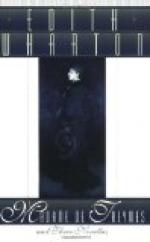She hesitated. “Yes, Christiane has been on my side. She dislikes her brother. But it would not do to ask her.”
“But could no one else ask her? Who are her friends?”
“She has a great many; and some, of course, are mine. But in a case like this they would be all hers; they wouldn’t hesitate a moment between us.”
“Why should it be necessary to hesitate between you? Suppose Madame de Treymes sees the reasonableness of what you ask; suppose, at any rate, she sees the hopelessness of opposing you? Why should she make a mystery of your opinion?”
“It’s not that; it is that, if I went to her friends, I should never get her real opinion from them. At least I should never know if it is was her real opinion; and therefore I should be no farther advanced. Don’t you see?”
Durham struggled between the sentimental impulse to soothe her, and the practical instinct that it was a moment for unmitigated frankness.
“I’m not sure that I do; but if you can’t find out what Madame de Treymes thinks, I’ll see what I can do myself.”
“Oh—you!” broke from her in mingled terror and admiration; and pausing on her doorstep to lay her hand in his before she touched the bell, she added with a half-whimsical flash of regret: “Why didn’t this happen to Fanny Frisbee?”
III
Why had it not happened to Fanny Frisbee?
Durham put the question to himself as he walked back along the quays, in a state of inner commotion which left him, for once, insensible to the ordered beauty of his surroundings. Propinquity had not been lacking: he had known Miss Frisbee since his college days. In unsophisticated circles, one family is apt to quote another; and the Durham ladies had always quoted the Frisbees. The Frisbees were bold, experienced, enterprising: they had what the novelists of the day called “dash.” The beautiful Fanny was especially dashing; she had the showiest national attributes, tempered only by a native grace of softness, as the beam of her eyes was subdued by the length of their lashes. And yet young Durham, though not unsusceptible to such charms, had remained content to enjoy them from a safe distance of good fellowship. If he had been asked why, he could not have told; but the Durham of forty understood. It was because there were, with minor modifications, many other Fanny Frisbees; whereas never before, within his ken, had there been a Fanny de Malrive.
He had felt it in a flash, when, the autumn before, he had run across her one evening in the dining-room of the Beaurivage at Ouchy; when, after a furtive exchange of glances, they had simultaneously arrived at recognition, followed by an eager pressure of hands, and a long evening of reminiscence on the starlit terrace. She was the same, but so mysteriously changed! And it was the mystery, the sense of unprobed depths of initiation, which drew him to her as her freshness had never drawn him. He had not hitherto attempted to define the nature of the change: it remained for his sister Nannie to do that when, on his return to the Rue de Rivoli, where the family were still sitting in conclave upon their recent visitor, Miss Durham summed up their groping comments in the phrase: “I never saw anything so French!”




